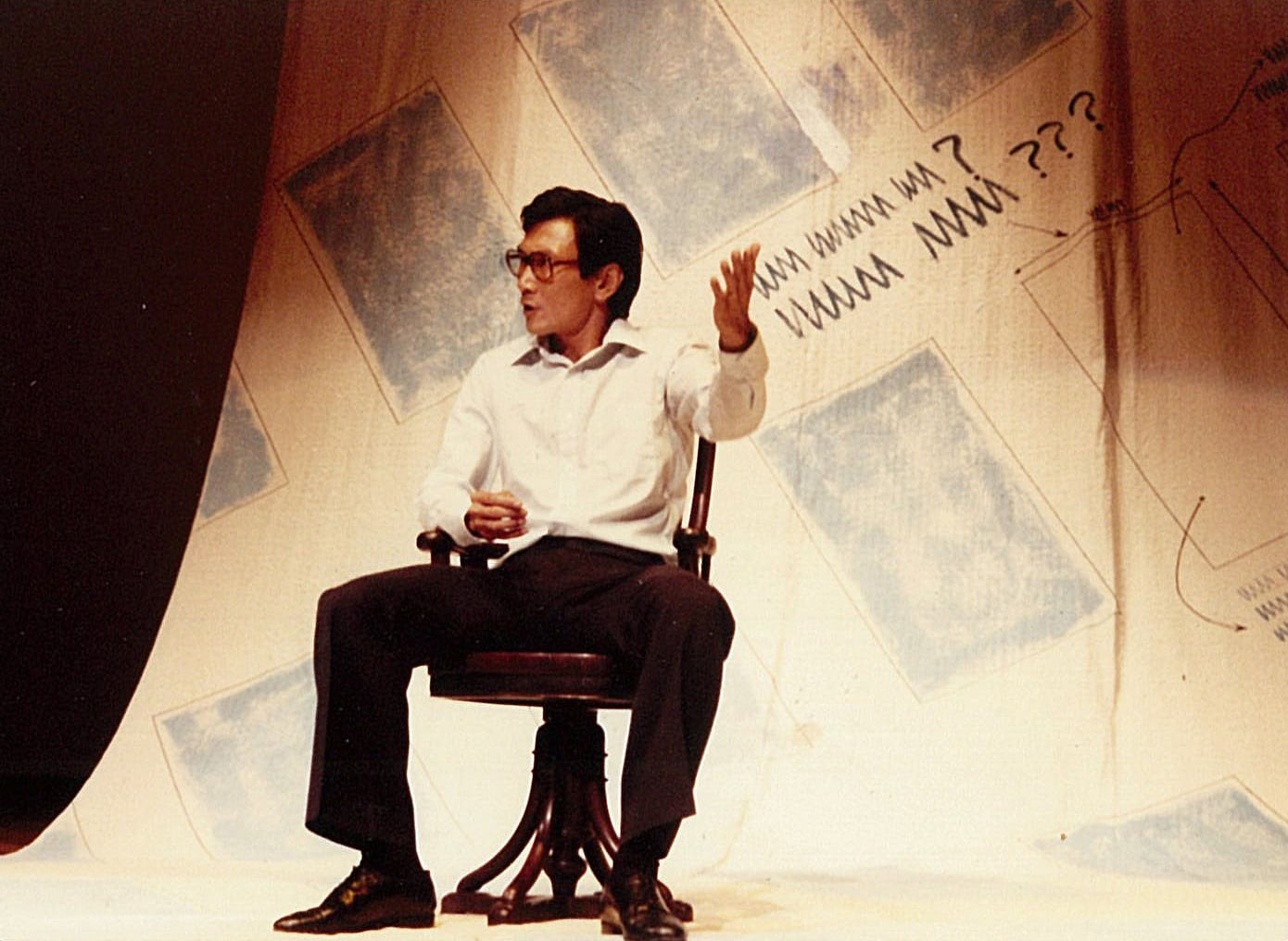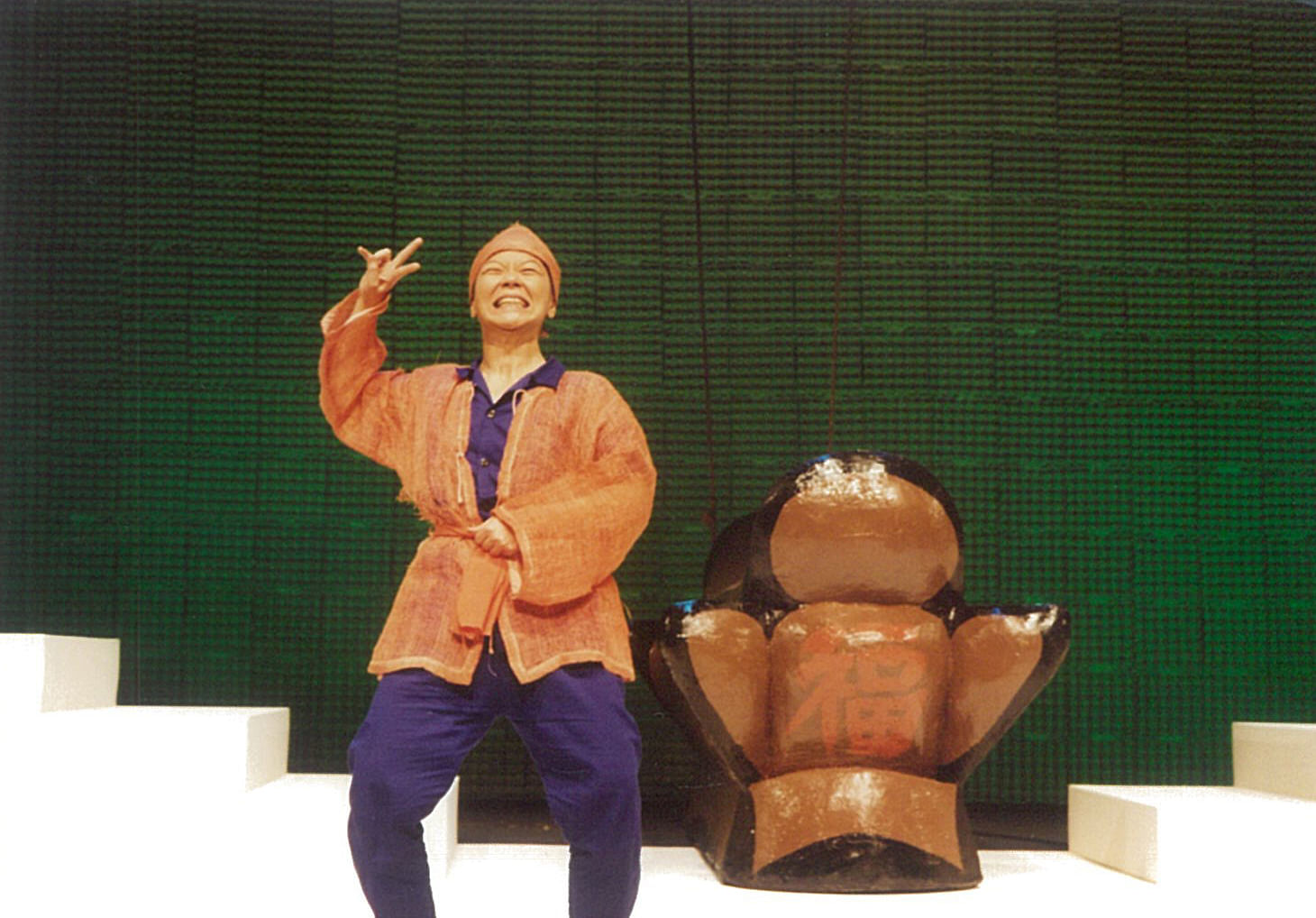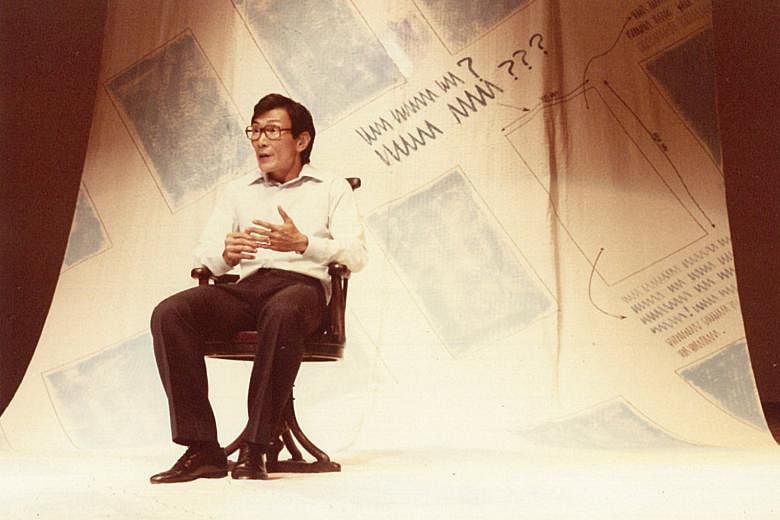Play: The Coffin Is Too Big For The Hole (drafted in 1984, staged in English and Mandarin in 1985)
Playwright: Kuo Pao Kun
What it is about: A man recalls the bizarre happenings at his grandfather's funeral in this Kafkaesque play. The cortege arrives at the burial site only to realise that the coffin is too big for the hole. As he tangles with the authorities over what to do with the coffin, what ensues in this brief monodrama is a powerful allegory for Singapore's restrictive bureaucracy, its growing homogeneity and what it means to be of a "standard size".
As Emily of Emerald Hill sashayed off stage in 1985 in her sequinned kebaya, all colour and old world glamour, an unnamed man entered the Singapore theatre that same year.
He was dressed in a plain white shirt and black slacks, the colours of mourning - but also the office drone uniform of the working Singaporean male. Anonymous, blending in, like everyone else. Standard. His creator, however, was anything but.
The late dramatist and theatre pioneer Kuo Pao Kun had decided to write his first play in English after years of working in the Chinese-language medium had established him as an incisive and sociallyconscious playwright, as well as a leader in the theatre community.
The idea for The Coffin first emerged during preparations for a production at the 1984 Singapore Arts Festival. Several writers had been asked to contribute to a showcase of home-grown plays, titled Bumboat. One of them was Kuo.
The play he wrote eventually became The Coffin. He said during a 2000 interview with The Straits Times: "It was written in about four or five hours. It just flowed out. I still remember that experience - it was wonderful."
Bumboat's American-Chinese director, Tzi Ma, tried but could not fit the piece into the framework of the production. Kuo called it a blessing in disguise, paving the way for a stand-alone production of The Coffin. That first draft was written in English and, as Kuo reworked it, he wrote a Chinese version as well, first performed by Zou Wenxue.
Actor Lim Kay Tong, 60, who originated the role in English, had been involved in Bumboat and had a taste of an early draft of The Coffin in rehearsal before it was removed. He tells Life!: "It felt like a very heavy piece compared with everything else; it definitely had a lot of gravitas with the whole ritual of the funeral and trying to create the right sounds and feeling of that. It was a whole group of us, chanting and dirge-ing."

Kuo approached Lim a year later for the lead role. The play was now stripped down to its bare bones as a one-man show. Lim says: "For me, that was panic stations. I had never done a long monologue. In drama school, we had to prepare monologues based on a Shakespearean character. Nothing like this, which was 30 to 35 minutes long. And he spent at least a couple of weeks just talking to me. I was worried. Because I thought, when is he going to get down to it?"
Among other things, they visited a coffin-maker and discussed the nature of funerals. Concerned, Lim secretly started memorising the script on his own.
In retrospect, he believes Kuo had a very clear vision of how the work would take shape. He says: "I think it was probably the correct approach, because it somehow got under your skin - all the talking, the background."
One of the few directions Lim recalls Kuo giving him was to stand up at certain points in the play. "He seemed to focus on whenever the script came back to the coffin. Those were the moments of focus," Lim says. "The rest of the time he just said, 'Tell the story'. That was all."
The allegorical piece was a marked departure from Kuo's more strident earlier works about the exploitation of the working class (The Struggle, 1969) and tensions with capitalism (The Sparks Of Youth, 1970).
Kuo was detained under the Internal Security Act for alleged communist activities from 1976 to 1980. Nanyang Technological University (NTU) professor Wee Wan-Ling notes in his introduction to The Complete Works Of Kuo Pao Kun that after detention, he moved "away from a singular approach to theatre based on the revolutionary need to transform society into a more plural comprehension of art's relation to society, one not tied in to specific ideological goals and in which art needed its own realm free from specific political agendas". There were no overt political gestures in The Coffin, nor vindictive criticisms of the Government.

The monodrama had an immediate impact when first staged in English on Nov 20, 1985. The Straits Times' reviewer John De Souza wrote: "It's... full of apparent lightness and innate humour, and takes veiled digs at society and establishment alike. Yet, for all that, The Coffin... is a powerful work. Its power lies in the simple, unpretentious form given to it by its creator and director, Kuo Pao Kun."
Since then, this compact work has been staged many times by theatre groups beyond Singapore's shores.
NTU associate professor Quah Sy Ren, who has published a book on a century of Chinese-language theatre in Singapore, cites the play's ability to be transposed into different cultural settings, such as a deconstructed production by Indonesia's experimental Teater Mandiri in 2001.
He says of Kuo's body of work: "His earlier works are very specific, presenting socio-political issues without much allegory. But his later works, because they are more allegorical, you can read them with or without knowledge of the social and political circumstances."
Alec Tok, 49, who played the protagonist in a 1990 revival for TheatreWorks' Retrospective, staged the play at Yale University about 10 years later. He says: "It struck a chord in American audiences too. They took it as the perennial fight between the individual and the state. In fact, a couple of the reviewers drew a parallel with (the Greek tragedy) Antigone.
"Antigone insisted on burying her brother, despite King Creon saying, he's an enemy of the state, so you can't. For me, Pao Kun's play had a universality and a classicism that, thousands of years ago, had already been thought about and articulated through plays."
As a result of his detention, Kuo was stripped of his Singapore citizenship, which was reinstated only in 1992. There was still a cloud of suspicion over anything that might be construed as sympathising with Marxism or communism.
But if Kuo was nervous, he never betrayed it, even if he did have some head-scratching rehearsal techniques.
Lim says, with amusement: "Pao Kun was always very calm. But he would call me at 3am and chat with me, and I would think, what tactic is this? Am I supposed to be slightly disorientated? Or suddenly he would decide, let's have a rehearsal at the Botanic Gardens. So we would meet there and rehearse on a bench."
The Coffin is still ubiquitous today in Singapore theatre curricula and in performance, a reminder that while much can change in 30 years, much can also remain the same. Few of the dead are now buried in "standard-sized" plots; instead, they are housed in "standardsized" niches in a columbarium.
The late Malaysian theatre director Krishen Jit directed Singapore actress Neo Swee Lin in a 2001 production of The Coffin by Wild Rice. Neo, 51, had a meta-theatre moment when the production toured to Kuala Lumpur's Bangsar Shopping Centre. Laughing, she says: "The coffin was too big for the theatre!" As life imitated art, the crew had to cut the coffin in two, bring it into the staging area, and then glue it back together.

In an introduction to Images At The Margins: A Collection Of Kuo Pao Kun's Plays (2000), Jit connected The Coffin narrator's deep respect for his grandfather and all that he stood for to Kuo's call "for a reviewing of the past which, in his view, is in danger of being discarded in the name of development. Kuo is arguing that the past is usable in building the sense of history and community".
Social commentary aside, The Coffin's stagings in both English and Mandarin marked the beginnings of a bilingualism - and eventually multilingualism - that has become pervasive in Singapore theatre. Kuo's Mama Looking For Her Cat (1988) would become the first play to employ a variety of languages and dialects with a distinctly Singaporean intonation on stage, tenderly capturing the way this country embraces its languages.
Many analyses of Kuo's monologues, Jit's included, have noted the influence of Chinese oral storytelling and crosstalk in the voices of these plays, a colloquial liveliness that made the plays deeply relatable. Kuo was able to draw from these performance traditions with a deftness that only someone effectively bilingual could command.
Through the event of a death in The Coffin, Kuo - who died in 2002 of cancer - breathed new life into a theatre scene on the cusp of professionalism. TheatreWorks, one of Singapore's flagship theatre companies after Kuo's Practice Performing Arts School (now The Theatre Practice), was founded in 1985.
Jit wrote: "In modern Singapore theatre, no one before Kuo had crossed from one language stream to another so radically and successfully... Once ensconced in English theatre, Kuo soon became the bridge-builder between the Mandarin and English streams."
As much as the bureaucrats in The Coffin venerated categories and boxes of a "standard size", Kuo meant to shake them up. What followed in the next chapter of Singapore theatre history was exactly what theatre was meant to do - push against boundaries and break down walls.
The Complete Works Of Kuo Pao Kun Volume Four: Plays In English, which includes The Coffin Is Too Big For The Hole, is available from Books Kinokuniya at $36.38.
The next instalment of this 15-part series will be published at the end of next month.


